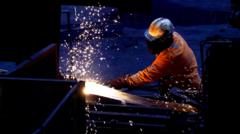Could British Steel's £500m Contract Transform UK Train Tracks?

British Steel Secures Major Contract: A New Era for UK Steelmaking
The recent announcement that British Steel has secured a five-year contract worth £500 million to supply train tracks for Network Rail marks a significant development for the UK's steel industry. This contract will allow the Scunthorpe steelworks to produce over 337,000 tonnes of track, ensuring the facility's short-term viability and showcasing the importance of British manufacturing. As discussions around national security and the future of steelmaking in the UK come into focus, this deal also underscores a renewed commitment to domestic production and infrastructure. In this article, we will explore the implications of this contract, the historical context of British Steel, and the broader challenges facing the UK steel industry.
The Significance of the Contract
British Steel's new contract with Network Rail represents an essential step forward for both the company and the British economy. The contract guarantees that British Steel will supply 80% of Network Rail's track requirements, while other European steelmakers will supplement with specialist rail products. This partnership not only reinforces British Steel's role as a key player in the industry but also reflects the government's commitment to supporting local businesses.
Clive Berrington, director for railway business services at Network Rail, emphasized the importance of sourcing materials locally when economically feasible. He stated, "British Steel remains extremely competitive in the provision of rail and will remain our main supplier in the years ahead." This sentiment highlights the importance of fostering domestic supply chains to ensure economic stability and growth.
A Boost for Scunthorpe and Its Workforce
The Scunthorpe steelworks, which has been producing rail since 1865, will benefit significantly from this contract. With approximately 2,700 employees, the facility is the last in the UK to produce virgin steel, a process that involves extracting iron from its original source for purification and treatment. Scunthorpe's four blast furnaces, named after English queens—Bess, Mary, Anne, and Victoria—are vital for this production process. However, only Bess and Anne are currently operational.
The contract secures jobs and sustains the local economy, directly impacting the livelihoods of hundreds of families in the area. The government’s intervention in April to take control of British Steel from its Chinese owner, Jingye, was largely motivated by concerns over the potential closure of these blast furnaces. If the furnaces were to be starved of fuel and shut down, the UK would lose its capacity to produce virgin steel, a situation that would have dire economic implications.
The Historical Context of British Steel
British Steel has a long and storied history within the UK. Established in 1967, the company has undergone various transformations and ownership changes, including its most recent acquisition by the UK government. In April 2023, the government seized control amid fears that its then-owner, Jingye, was planning to halt operations at the Scunthorpe plant. This intervention has sparked discussions about the future of steelmaking in the UK and raised questions about national security, particularly in light of recent global trade tensions.
Challenges Facing the UK Steel Industry
While the new contract is a positive development, the UK steel industry is facing numerous challenges that could affect its long-term sustainability:
- International Competition: Steel manufacturers across Europe and beyond are often able to produce steel at lower costs, primarily due to cheaper energy prices and government subsidies.
- Environmental Regulations: Stricter regulations surrounding emissions and sustainability are forcing UK steelworks to adapt quickly, often requiring significant investment.
- Trade Tariffs: The potential for increased tariffs on steel imports from the US poses a threat to UK businesses, affecting their competitiveness in the international market.
- Investment Needs: Aging infrastructure and equipment require substantial capital investment to modernize and improve efficiency.
Government's Role in Revitalizing the Steel Industry
The UK government has recognized the challenges facing the steel sector and is actively working to ensure its viability. The recent contract with Network Rail is part of a broader strategy to strengthen domestic manufacturing capabilities and support local economies. Transport Secretary Heidi Alexander emphasized that this contract "truly transforms the outlook for British Steel," hinting at more initiatives aimed at reinforcing the UK's manufacturing base.
While the government has not fully nationalized British Steel, it has indicated that it may consider public ownership if necessary. In the meantime, efforts are underway to attract private investors to support steelmaking operations and ensure job security for thousands of workers in the sector.
The Importance of Virgin Steel Production
Virgin steel production is crucial for numerous construction projects, including railway infrastructure, buildings, and other major developments. The process of producing virgin steel is complex and resource-intensive, making it essential for the UK to maintain its production capabilities. The Scunthorpe plant plays a pivotal role in this, as it is the last remaining facility capable of producing virgin steel in the UK. As such, any threat to its operation could have far-reaching consequences for the entire construction industry.
Looking Ahead: The Future of British Steel
With the new contract in place, British Steel's immediate future appears more secure. However, the company will need to navigate various challenges in the coming years to remain competitive. The government's commitment to supporting domestic manufacturing through contracts like this one is a step in the right direction, but a long-term strategy will be essential to ensure the UK steel industry's sustainability.
As the government releases its national infrastructure strategy, it will be crucial to see how it plans to address the broader issues facing the steel sector. The focus must be on balancing economic growth with environmental sustainability and job security, as the industry adapts to a rapidly changing global landscape.
FAQs
What is the significance of the contract between British Steel and Network Rail?
The contract is significant as it secures the production of over 337,000 tonnes of train tracks for Network Rail, ensuring the short-term future of the Scunthorpe steelworks and safeguarding jobs for thousands of workers.
How does virgin steel production impact the construction industry?
Virgin steel production is crucial for construction projects as it provides the necessary materials for building infrastructure like railways and buildings. It is essential to maintain this production capability to support ongoing and future projects.
What challenges does the UK steel industry face?
The UK steel industry faces challenges such as international competition, environmental regulations, trade tariffs, and the need for significant investment in aging infrastructure.
What role does the government play in supporting British Steel?
The government has intervened to take control of British Steel and is actively seeking to support local manufacturing through contracts and potential investments, ensuring the viability of the steel industry in the UK.
The British Steel contract with Network Rail is not just a business deal; it symbolizes a commitment to domestic manufacturing and economic resilience. As the UK navigates the complexities of the steel industry, the focus must remain on ensuring that British Steel can thrive in an increasingly competitive global market. What do you think the future holds for British Steel and the UK steel industry overall? #BritishSteel #UKSteel #ManufacturingResilience
Published: 2025-06-16 23:12:05 | Category: technology



